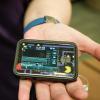Lisa Marshall
 At least 25 U.S. airports now use facial recognition software to determine you are who you say you are, but some fear the artificial intelligence systems will exacerbate discrimination. Morgan Klaus Scheuerman, an AI ethicist, explains why people are concerned.
At least 25 U.S. airports now use facial recognition software to determine you are who you say you are, but some fear the artificial intelligence systems will exacerbate discrimination. Morgan Klaus Scheuerman, an AI ethicist, explains why people are concerned. With the Fourth of July approaching and a thick green carpet of fuel covering much of the West after a rainy spring, CU Boulder fire ecologist Jennifer Balch is calling on people to do their part to prevent the next megafire.
With the Fourth of July approaching and a thick green carpet of fuel covering much of the West after a rainy spring, CU Boulder fire ecologist Jennifer Balch is calling on people to do their part to prevent the next megafire. New research shows that cancer cells can adapt in as little as one to two hours to new drugs called CDK2 inhibitors. The good news: Adding a second, widely available drug disables this workaround, squelching tumor growth.
New research shows that cancer cells can adapt in as little as one to two hours to new drugs called CDK2 inhibitors. The good news: Adding a second, widely available drug disables this workaround, squelching tumor growth. An ancient, virus-like protein best known for its essential role in placental development may, when over-expressed, fuel ALS—aka Lou Gehrig's disease—and other neurodegenerative diseases, according to new research. The discovery opens the door to a new class of potential treatments.
An ancient, virus-like protein best known for its essential role in placental development may, when over-expressed, fuel ALS—aka Lou Gehrig's disease—and other neurodegenerative diseases, according to new research. The discovery opens the door to a new class of potential treatments.
 Could technology like smart watches and mobile apps change how patients manage Type 1 diabetes? A $1.2 million grant is helping faculty explore ways to give patients a better quality of life.
Could technology like smart watches and mobile apps change how patients manage Type 1 diabetes? A $1.2 million grant is helping faculty explore ways to give patients a better quality of life. Advances in gene-editing have made it possible to banish hereditary diseases, eradicate pests and create new life forms, but should we go there? Jennifer Doudna along with two other Nobel laureates will join a panel of world leaders for a free public forum.
Advances in gene-editing have made it possible to banish hereditary diseases, eradicate pests and create new life forms, but should we go there? Jennifer Doudna along with two other Nobel laureates will join a panel of world leaders for a free public forum. A new study led by Angela Bryan, a CU Boulder professor and cancer survivor, is among the first to assess how cannabis bought over the counter at dispensaries—rather than government-supplied or synthetic varieties—impacts cancer symptoms or chemotherapy side effects.
A new study led by Angela Bryan, a CU Boulder professor and cancer survivor, is among the first to assess how cannabis bought over the counter at dispensaries—rather than government-supplied or synthetic varieties—impacts cancer symptoms or chemotherapy side effects. The study of 46 million births across nearly three decades is among the first to provide population-level statistical evidence of “obstetric racism,” a term coined recently to describe a concerning pattern of maltreatment of non-white pregnant women, including a disregard for their birthing wishes.
The study of 46 million births across nearly three decades is among the first to provide population-level statistical evidence of “obstetric racism,” a term coined recently to describe a concerning pattern of maltreatment of non-white pregnant women, including a disregard for their birthing wishes. By inhibiting a protein that helps cancer cells repair themselves, scientists hope to develop new drugs that treat resistant tumors with fewer side effects.
By inhibiting a protein that helps cancer cells repair themselves, scientists hope to develop new drugs that treat resistant tumors with fewer side effects. A new “digital nose” created with Nobel Prize-winning CU technology can provide COVID-19 test results in less than one hour with excellent accuracy. It could ultimately be used for on-the-go virus testing, diagnosis of cancer and lung diseases and more.
A new “digital nose” created with Nobel Prize-winning CU technology can provide COVID-19 test results in less than one hour with excellent accuracy. It could ultimately be used for on-the-go virus testing, diagnosis of cancer and lung diseases and more.


